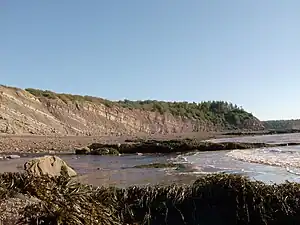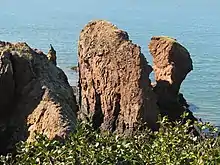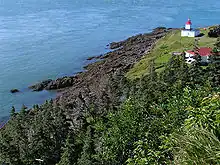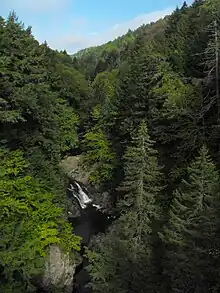
The Minas Basin (also referred to as the Fundy Shore) is a region in the northwest of Nova Scotia. It is known for having some of the highest tides in the world and its sandstone cliffs and outcrops attract rockhounds and fossil hunters. The most notable of these is the Joggins Fossil Centre, near Amherst, which is a UNESCO World Heritage Site.
Cities
- 🌍 Amherst — known for the Amherst Point Bird Sanctuary, 5 km away, which is home to abundant waterfowl and marshbirds
- 🌍 Parrsboro — known for its seasonal theatre productions, fossil and rock hounding attractions, museums, high tides and heritage buildings
- 🌍 Springhill — a former coal-mining town that is home to the Anne Murray Centre, which celebrates the work of the popular singer
- 🌍 Truro — the largest town in the region, and was a major railway hub
Other destinations

- 🌍 Joggins Fossil Cliffs — Fossil records dating from 310 million years ago, near Amherst
- 🌍 Advocate Harbour — home of the scenic Cape d'Or Lighthouse, and is a well-known sea kayaking destination
- 🌍 Cape Chignecto Provincial Park — Small local park, featuring three small hikes/walks to enjoy the countryside
- 🌍 Shubenacadie Provincial Wildlife Park — near Shubenacadie, is a 40-hectare park with animals, an interpretive centre, hiking trails, a picnic area and playground
- 🌍 Burntcoat Lighthouse Park - Worlds highest tides
Understand

The Minas Basin is an inlet of the Bay of Fundy and a sub-basin of the Fundy Basin, as is the Cobequid Bay.
The Mi'kmaq were the first people to inhabit the area around the Minas Basin. Mi'kmaq tradition ties the god Glooscap in with significant geographical features such as Cape Blomidon and Five Islands.
European explorers and traders arrived in the early 1600s. Among them were the French explorer Samuel de Champlain who explored the copper deposits at Cape d'Or at the entrance to the Basin in 1607. Champlain bestowed the name "Port of Mines" on nearby Advocate Harbour to reflect the seams of copper ore at Cape d'Or. The name "Les Mines" was later anglicized to Minas Basin.
French Acadian settlements began in the late 1600s first with settlements around the southern shore of the Minas Basin. The Acadians reclaimed considerable farmland through the use of dykes and aboiteaux. Their dyke systems — greatly expanded by later additions — are still used near Truro and Wolfville at Port Williams and Grand Pré. In 1755, the British forcibly expelled the over 12,000 Acadians from Grand Pré, Pisiguit, Cobequid, and Beaubassin, in what became known as the Grand Dérangement, or Great Expulsion.
Get in
By car
The Trans-Canada Highway 104 follows the northeastern edge of region, connecting Amherst and Truro with New Brunswick, Halifax and the rest of Nova Scotia. Highway 104 between Amherst and Truro is known for car accidents in the winter.
By bus
Maritime Bus routes stop in Amherst and Truro and provide bus connections from Moncton, Charlottetown, Cape Breton Island and Halifax.
By plane
There are no major airports in the region, but a couple are within an hours drive. One hour south is the Robert L. Stanfield International Airport (YHZ IATA), at Halifax, and about 45 minutes north is Greater Moncton International Airport (YQM IATA).
Get around
The only way to really get around and see the region is to have your own set of wheels. Highway 2 connects Springhill and Parrsboro with Amherst and Truro, while Highway 209 will bring you to the shores of the Minas Basin. The Glooscap Trail is a scenic route around the Minas Basin and Cobequid Bay from Wolfville to Amherst.
See
The Amherst Point Bird Sanctuary has abundant waterfowl and other marshbirds. The majority of waterfowl species found in the Atlantic Provinces can be found within this site. A 2.5-km interpretive hike circles Laytons Lake.
The Bay of Fundy is home of the world's highest tides, and is a unique ecosystem that attracts millions of migratory birds, whales and abundant marine life. Twice daily the bay empties exposing broad sweeping tidal flats, gem stones and fossils. Parrsboro is a good place to see it.
The Anne Murray Centre in Springhill is a museum dedicated to a singer who has sold over 55 million albums, received four Grammy awards, 24 Juno awards, 3 American Music Awards, and 3 Canadian Country Music Association Awards.
The Springhill Coal Mining National Historic Site and Springhill Miners' Museum allows you to tour the depths of a Springhill coal mine. You can hear stories of the disaster of 1891, the 1916 subterranean fire which raged through the galleries, the loss of 39 men in the 1956 explosion, and the major “bump” in 1958 which killed 75 men.
The , where you can walk on the floor of the ocean and experience the worlds highest tides. There is also an annual gourmet meal prepared by a local restaurant that you can enjoy on the ocean floor at low tide.
Do

“The Great Trail” or Trans-Canada Trail System includes an arm of the Cumberland Trail stretching from “The Junction” at Fisher Road passing northwest of Springhill near Lisgar and Queen Street near Springhill Lion's Park and travelling southwest toward Lagoon Road. This leg of multi-use trail travels southwest toward Parrsboro passing Newville and Gilbert Lakes.
The Truro Winter Long John Festival in early February is the focus of the town's winter events (curling, snowshoeing, sledge hockey, skating, pickleball).
Eat
- Sutherland's Diner, 2808 Main St. Shubenacadie on the 102, ☏ +1 902-758-0114. Sandwiches, fish & chips, burgers at low prices.
- The Flying Apron Inn & Cookery, 3 Summerville Wharf Rd, Summerville, NS B0N 2K0, ☏ +19026332300. Good local restaurant and coffee shop with country charm.
- Walton Pub and Eatery, 39 215 Hwy, Walton NS B0N2R0, ☏ +1 902 528-2670. Basic Pub with indoor and outdoor patio seating. You can watch the water from the river as it meets the tidal water from the patio.
- Fine Dining on the Ocean Floor (Food Fantastique). Unique VIP experience on the ocean floor at Burntcoat Lighthouse. Select times throughout the summer. $1,600 per couple for VIP multicourse meal.